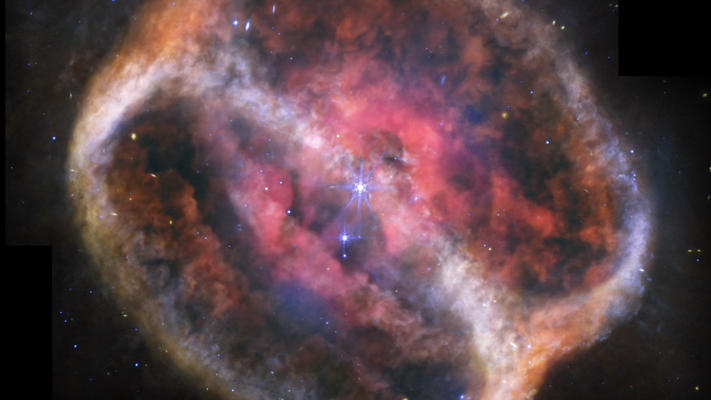Space scientists and astronauts launch to other platforms amid Twitter turmoil
Has the Twitter "space" flight begun?

Unless you've been living under a moon rock, you've likely heard that Twitter is going through some drama now that SpaceX CEO Elon Musk is at the helm. While Musk maintains that his primary concern for the social media site is to facilitate freedom of speech and expression, others on the platform, particularly users from marginalized communities, have expressed concern that the loosening of moderation rules will lead to an increase in hate speech and misinformation.
Such fears have prompted many users to quit, or at least threaten to quit, the site entirely. And it's not just political commentators or Twitter influencers; a number of scientists, and at least one astronaut, have threatened to log off Twitter for good.
Related: Scientist admits 'space telescope' photo is actually chorizo in tasty Twitter prank
Looks like my days of Twitter with a blue checkmark are coming to an end! I refuse out of principle to pay $7.99 to have a blue check mark next to my name. Also evaluating my participation on this platform and will leave if hateful messaging is not regulated! Peace out @elonmuskNovember 6, 2022
The moves are part of a larger trend under the hashtag #TwitterMigration, which is taking off among many in the science Twitter community, including former Google AI ethicist Timnit Gebru, astrophysicist Chanda Prescod-Weinstein and others.
For this exact reason I’m parked at chanda@blacktwitter.io even though I’m not using it right now because of how much harassment I experienced on mastodon last week https://t.co/NtFB7Vb5x4November 16, 2022
Meanwhile, others believe Musk is exactly the right person to meet the challenge of transitioning Twitter to profitability, given his success with SpaceX.
People are seriously doubting the guy who can fly rockets to space and land them back on Earth can't solve social media @elonmusk#socialmedia #revolution #twitter #TwitterTakeover #twitterblades #TwitterLayoffs #TwitterMigration #TwitterBlueTick pic.twitter.com/uLTefLO0lnNovember 14, 2022
Regardless of Twitter's ultimate fate, the Twitter climate in recent weeks has led to an explosion in monthly active users for Mastodon, a decentralized and ad-free social networking framework that operates more like a collection of autonomous Discord servers or Reddit communities than a single unified platform. According to Mastodon CEO Eugen Rochko, there are now more than a million monthly active users on Mastodon.
This might be a far cry from Twitter's roughly quarter of a billion daily active users — as reported in Twitter's most recent financial disclosure in July 2022 — but it's nonetheless a major milestone for the volunteer-run social media platform.
Get the Space.com Newsletter
Breaking space news, the latest updates on rocket launches, skywatching events and more!
I've just set myself up on Mastodon as @ProfHughLewis@mastodon.online. I will be continuing to post threads on #SpaceDebris, #SpaceSustainability, #Starlink, #OneWeb, and my #MECFS journey here on Twitter & on Mastodon for the time beingOctober 31, 2022
Mastodon has a somewhat higher technical barrier to entry for those who are used to just logging in to a single Twitter account and seeing a timeline. But for Twitter users in the science community — many of whom are professors or active researchers in fields where technical proficiency is a foregone conclusion — these barriers don't seem to have stemmed the tide in the least bit.
The Twitter turmoil might be awkward for some in the space community, who effectively find themselves in rebellion against the SpaceX CEO who has arguably done more to reinvigorate U.S. spaceflight in the past decade than just about anyone. But for many astronomers, Twitter might just be the latest thing Musk has ruined for them.
In addition to ferrying NASA astronauts to the International Space Station, SpaceX is deploying a massive constellation of Starlink satellites to provide broadband internet access on a global scale, but at the unfortunate cost of flooding the night sky with bright, streaking objects that have wreaked havoc on ground-based astronomical observations.
It remains to be seen whether the Twitter exodus will continue, but given the challenge Musk faces in getting "Twitter 2.0" off the ground, the stars might just be aligning for Twitter alternatives such as Mastodon.
Follow us on Twitter @Spacedotcom and on Facebook.
Join our Space Forums to keep talking space on the latest missions, night sky and more! And if you have a news tip, correction or comment, let us know at: community@space.com.
John is a science and technology journalist and Space.com contributor. He received his B.A. in English and his M.A. in Computer Science from the City University of New York, Brooklyn College, and has bylines with TechRadar, Live Science, GamesRadar, and other publications. You can find him on Bluesky at @johnloeffler.bsky.social or seeking out dark sky country for spectacular views of the cosmos.









